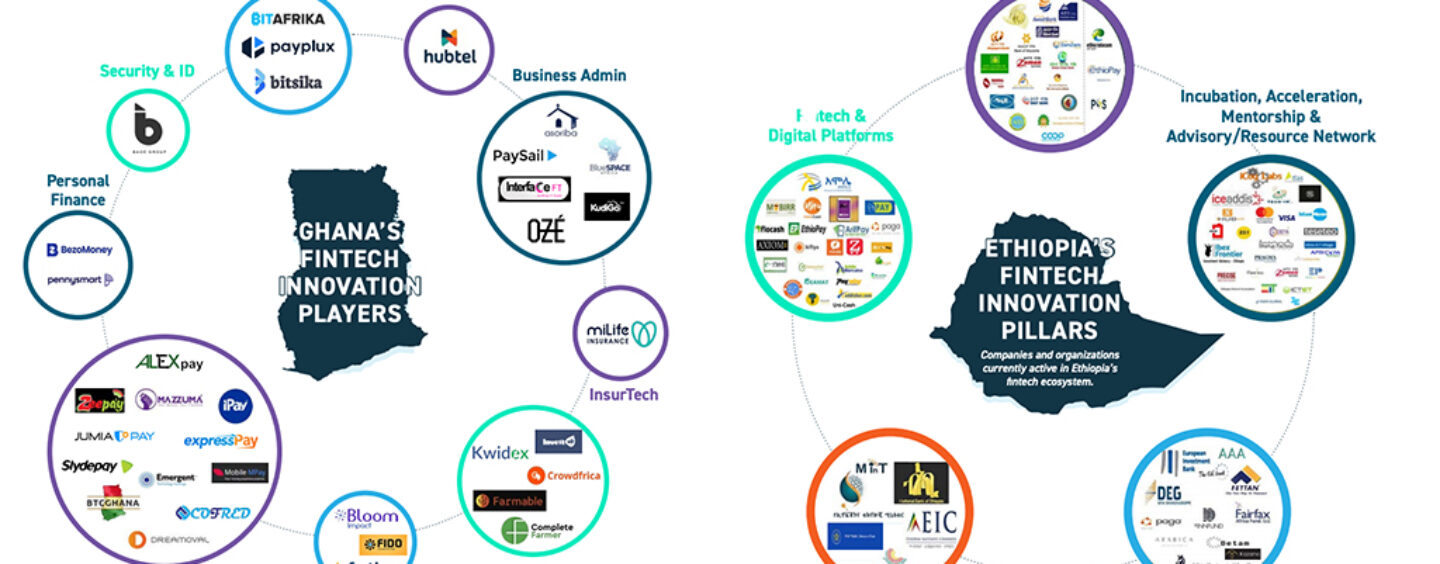
Ethiopia, Ghana and Rwanda Among Africa’s Fastest-Growing Fintech Ecosystems: Report
19. January 2021South Africa, Nigeria and Kenya have historically been the fintech hubs of Africa, but the next chapter for the industry in the continent will likely come from new, fast-growing ecosystems, including Ethiopia, Ghana and Rwanda, according to a new report.
The Africa Fintech: State of the Industry 2020 report, produced by Africa Fintech Summit in partnership with EFG EV Fintech and released in October 2020, looks at the state of fintech in Africa, outlining the key trends and emerging fintech ecosystems to watch out for.
Ethiopia
According to the study, Ethiopia is undergoing an unprecedented acceleration of its digital transformation agenda, propelled by new regulatory changes.
In June 2020, Ethiopia’s Council of Ministers approved Digital Ethiopia 2025, a national digital transformation plan that seeks to embrace cutting edge technologies to ensure economic growth and social development.
In March 2020, the National Bank of Ethiopia issued a new Payments Instruments Issuers Directive, allowing local non-bank actors, including mobile network operators, to offer mobile money services — a significant change in a market where digital financial services offerings have historically been under the strict purview of traditional banks.
Compared to the size of its economy and population, Ethiopia’s fintech ecosystem is relatively small, but the government’s supportive stance towards the digital economy, and favorable market conditions, including high mobile phone penetration and a large population of unbanked, are making Ethiopia’s fintech industry poised for strong growth, the report says.
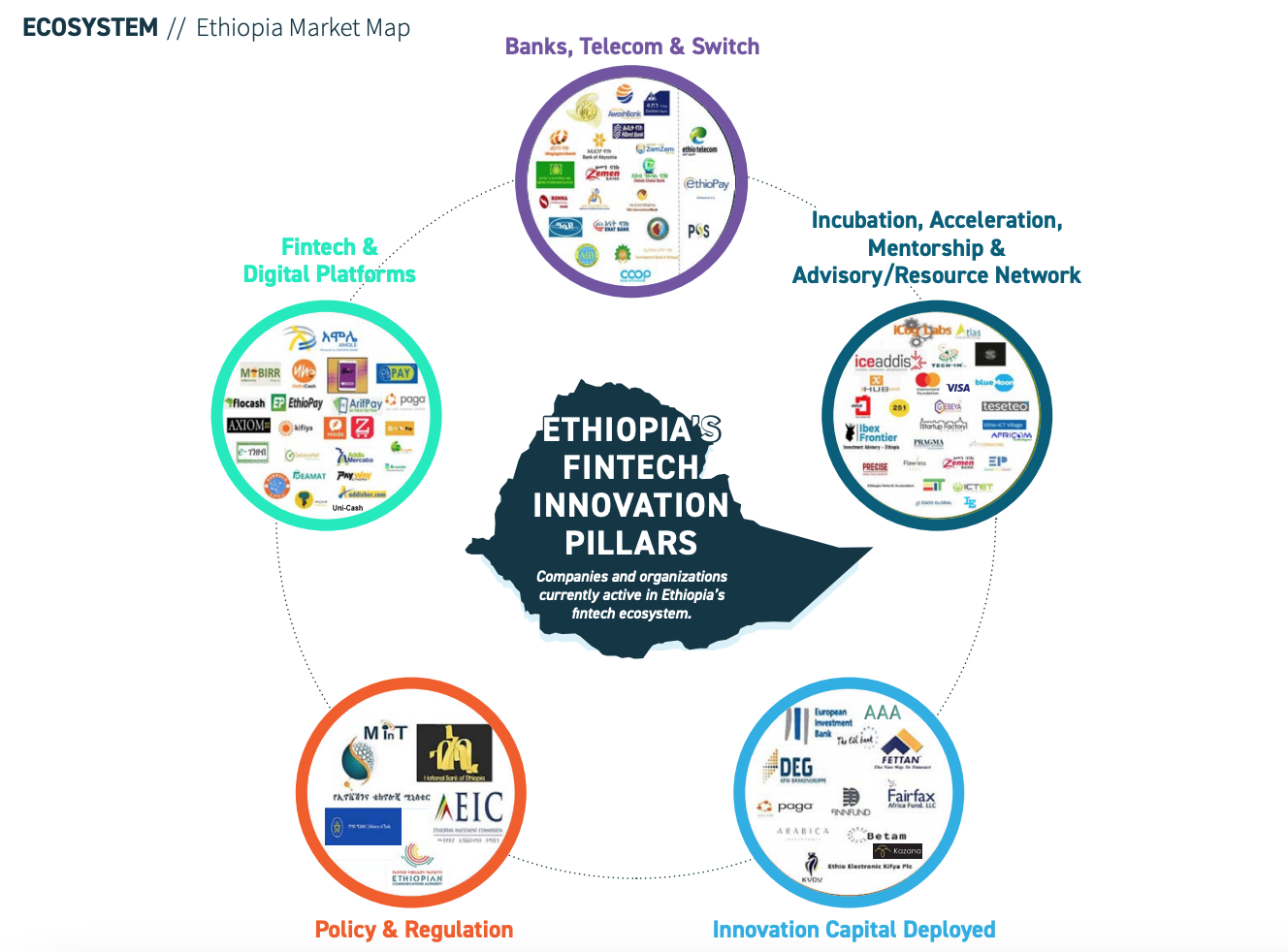
Ethiopia Market Map, Africa Fintech: State of the Industry 2020, Oct 2020
Ghana
In Ghana, progressive digitalization policies and strong mobile money adoption have made the country one of the fastest growing fintech ecosystems in Africa.
Ghana introduced its first-ever fintech-related legislation, the Electronic Transactions Act, back in 2008. Since then, new laws have been rolled out to support the adoption of digital financial services. These include the Payment Systems and Service Act in May 2019, which amended and consolidated the laws relating to payment systems and payment services, and provides a regulatory framework for businesses carrying on payment services and electronic money services. Most recently, in March 2020, Ghana became the first country in Africa to implement a universal quick response code (QR Code) payment system.
Ghana’s fintech ecosystem currently comprises players operating in varied segments, including wealthtech, insurtech, payments, blockchain, personal finance and cybersecurity.
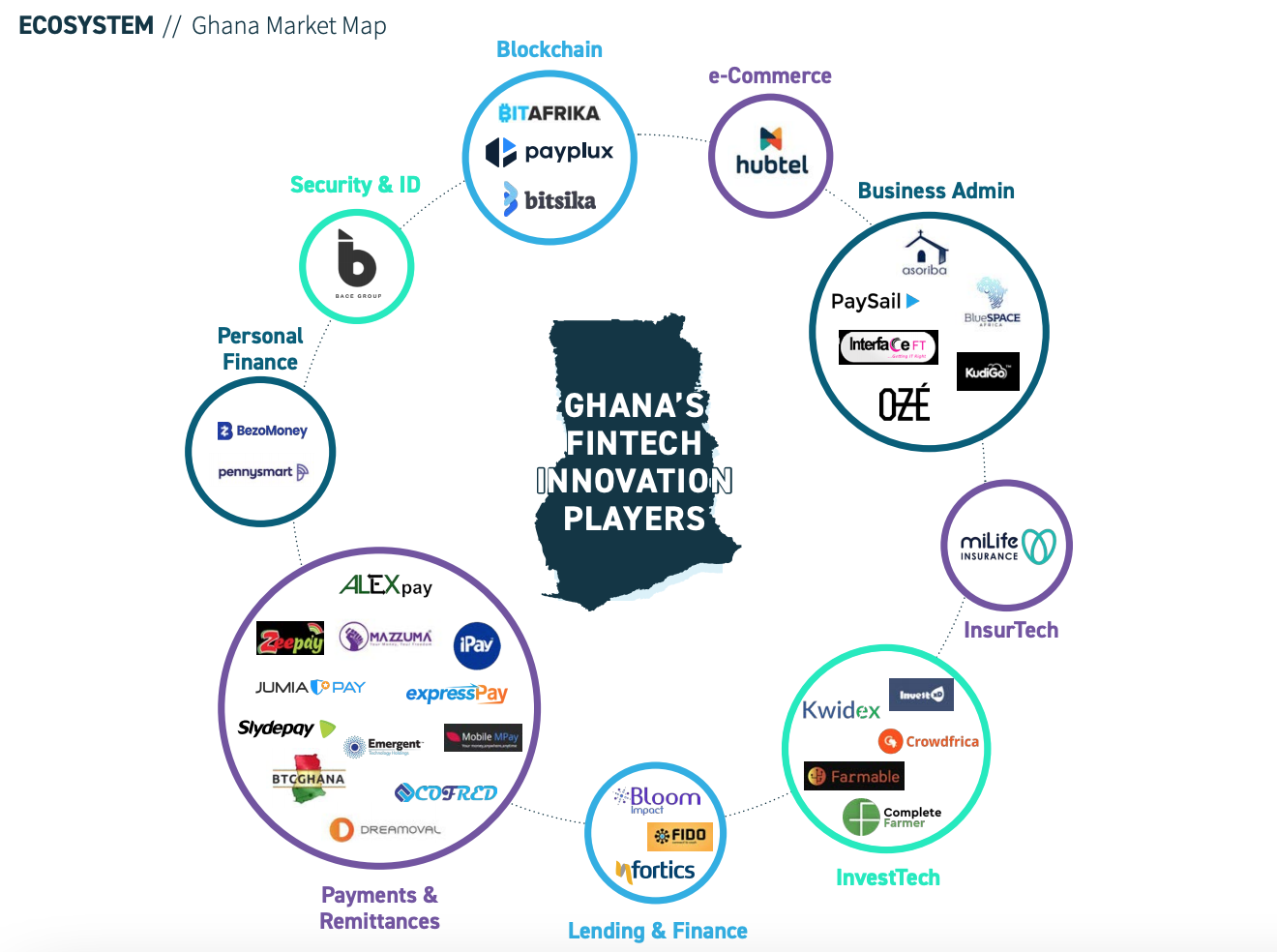
Ghana Market Map, Africa Fintech: State of the Industry 2020, Oct 2020
Rwanda
Rwanda is another emerging fintech ecosystems in Africa. The report praises the country for having some of the continent’s most progressive and responsive information and communications technology (ICT)-related initiatives.
The research identified at least five broad national-level policy frameworks adopted by the government over the past five years. These initiatives aim to promote the digitalization of various sectors, including financial services.
The National Strategy for Transformation 2017-2024, for example, seeks to increase the value of electronic payment transactions from 27% to 80% of the GDP by 2024. These initiatives, coupled with the introduction of mobile money, drove a 26% increase in financial inclusion over a four-year period, reaching 68% in 2016.
As of December 2019, Rwanda was home to more than 40 fintech startups with payments/remittances (17 companies) and lending/financing (14 companies) being the most developed segments, according to a research by the United Nations Capital Development Fund (UNCDF).
Africa’s fintech leaders
South Africa, Nigeria and Kenya are currently Africa’s biggest fintech ecosystems.
South Africa, an early mover in fintech regulation and development, was home to 217 operational fintech companies as of May 2019. Payments (30%), business-to-business (B2B) tech support (20%), and lending (12%) were the three biggest segments, according to the Fintech Scoping in South Africa report by the South African Intergovernmental Fintech Working Group (IFWG).
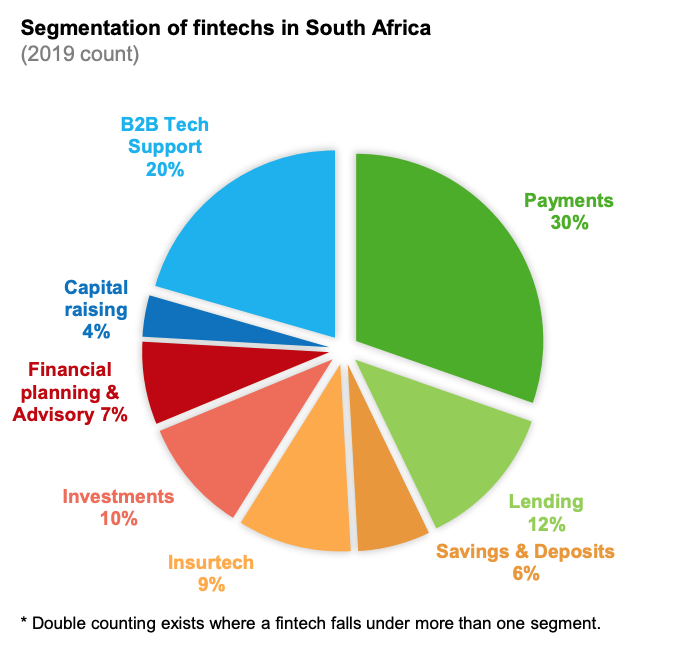
Segmentation of fintechs in South Africa (2019 count), Fintech Scoping in South Africa, Nov 2019
Behind South Africa is Nigeria, Africa’s largest economy. Nigeria counts more than 160 fintech companies, which raised US$122 million in funding in 2019, according to the 2019 African Tech Startups Funding Report.
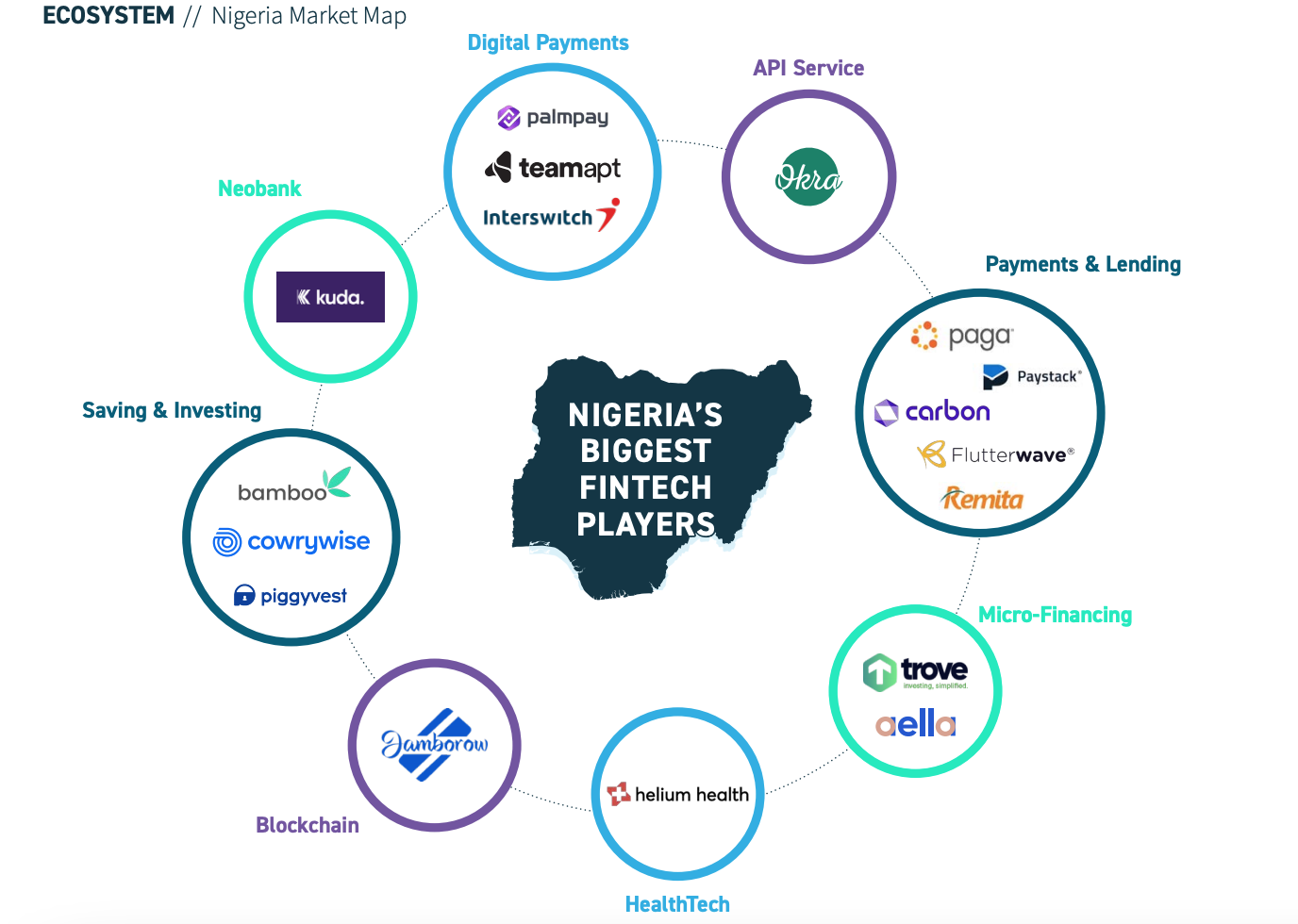
Nigeria Market Map, Africa Fintech: State of the Industry 2020, Oct 2020
Finally, Kenya, the birthplace of mobile money leader M-Pesa, is deemed in the Africa Fintech: State of the Industry 2020 report as “the East African fintech hotspot.”
Home to the largest and most successful mobile money sector in Africa, Kenya has consistently led the continent both in scale and innovation. Today, Kenya’s fintech industry boasts approximately 150 fintech companies with services ranging from digital credit entities to remittances and transfer platforms.







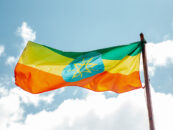
9 Comments so far
Jump into a conversation